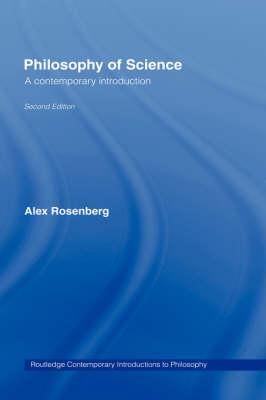Overview
Identifies the philosophical problems that science raises through an examination of questions about its nature, methods and justification. A valuable introduction for science and philosophy students alike.
Full Product Details
Author: Alex Rosenberg
Publisher: Taylor & Francis Ltd
Imprint: Routledge
Edition: 2nd New edition
Dimensions:
Width: 15.60cm
, Height: 2.30cm
, Length: 23.40cm
Weight: 0.476kg
ISBN: 9780415343169
ISBN 10: 041534316
Pages: 224
Publication Date: 20 May 2005
Audience:
College/higher education
,
Tertiary & Higher Education
Format: Hardback
Publisher's Status: Out of Print
Availability: In Print 
Limited stock is available. It will be ordered for you and shipped pending supplier's limited stock.
Table of Contents
Acknowledgments Chapter 1: Why Philosophy of Science? 1. The relationship between science and philosophy 2. Scientific questions and questions about science 3. Modern science as philosophy 4. Understanding science and understanding Western civilization Summary, Study questions, Guide to literature Chapter 2: Explanation, Causation and Laws 1. Logical positivism sets the agenda 2. Defining scientific explanation 3. Why do laws explain? 4. Counter-examples and the pragmatics of explanation Summary, Study questions, Guide to literature Chapter 3: Scientific Explanation and its Discontents 1. Inexact laws and probabilities 2. Causation and teleolog 3. From intelligibility to necessity Summary, Study questions, Guide to literature Chapter 4: The Structure and Metaphysics of Scientific Theories 1. How do theories work? 2. The problem of theoretical terms and the things they name 3. Reduction, replacement and the progress of science 4. Theories and models 5. A case study: the theory of natural selection Summary, Study questions, Guide to literature Chapter 5: The Epistemology of Scientific Theorizing 1. Brief history of empiricism as science's epistemology 2. The epistemology of scientific testin 3. Induction as a pseudo-problem: Popper's Gambit 4. Statistics and probability to the rescue? 5. Underdetermination Summary, Study questions, Guide to literature Chapter 6: The Challenge of History and Post-Positivism 1. A place for history? 2. No place for first philosophy? 3. Are scientific research programs rational? Summary, Study questions, Guide to literature Chapter 7: The Contested Character of Science and the Fundamental Questions of Philosophy 1. From philosophy through history to postmodernism 2. Scientism, sexism and significant truths 3. Dealing with relativism: Could the earth really be flat? Summary, Study questions, Guide to literature Bibliography Index.
Reviews
A first-rate, challenging text that emphasizes the philosophy in the philosophy of science. Rosenberg offers a superb introduction to the epistemological and metaphysical issues at stake in modern science.
Author Information
Alexander Rosenberg is Professor of Philosophy at Duke University, North Carolina, USA. His ten books in the philosophy of science include The Structure of Biological Science (1985) and Philosophy of Social Science (1995). He has been a Guggenheim Fellow, a Fellow of the American Council of Learned Societies and the National Science Foundation. In 1993 he won the Lakatos Prize in the Philosophy of Science.
Tab Content 6
Author Website:
Countries Available
All regions
|



